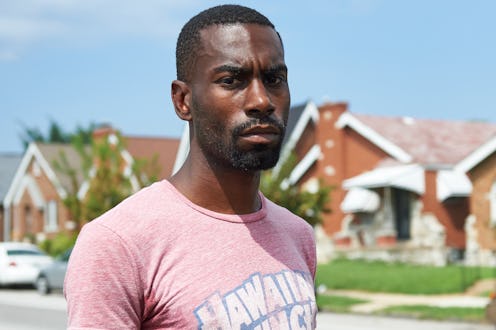News
What We Know About DeRay McKesson's Arrest
More than a hundred people were arrested in Baton Rouge, Louisiana, on Saturday night during protests over the deadly shooting of Alton Sterling by police earlier in the week. One of the individuals who remained in police custody on Sunday morning was prominent Black Lives Matter activist DeRay McKesson of Baltimore, Maryland. In Baton Rouge for the protests, McKesson was likely arrested for blocking traffic, but many of his fellow protestors don't see it that way.
McKesson has worked as an educator and community organizer for years. Since the birth of the Black Lives Matter movement, McKesson has spent much of his time traveling to the cities where acts of violence have seemed to target African Americans, including Ferguson, Missouri; his hometown of Baltimore; Charleston, South Carolina; and now, Baton Rouge. On Saturday, he live-streamed his participation in protests there on Periscope. According to The Washington Post, McKesson was tackled by police and taken into custody around 11 p.m. He had been walking along the side of what appeared to be a busy street with a group of other protesters, as they were all leaving a nearby rally.
Across all of Baton Rouge, a local official told the Post that more than 120 people had been arrested during protests on Saturday, and that McKesson had been charged with "obstructing a highway of commerce." As of late Sunday morning, bond had not been set.
On Sunday morning, it wasn't clear how long McKesson would remain in police custody. #FreeDeRay trended on Twitter, as McKesson's supporters shared their disbelief and discontent toward his arrest. One of McKesson's closest allies in the Black Lives Matter movement, Brittany Packnett, shared updates about his status and condition. Packnett co-founded the civil rights advocacy group Campaign Zero with McKesson.
As Packnett tweeted on Sunday morning, McKesson was not sure what charges he officially faced, if any. According to the Louisiana state legislature, there are two kinds of "obstructing a highway of commerce" charges, a simple and an aggravated one. Simple obstruction is punishable by a fine of up to $200 and/or up to six months in prison, while aggravated obstruction is much more serious.
One of the most debated parts' of McKesson's arrest was whether or not he had been blocking traffic. Police had reportedly warned him and the group of protesters around him to stay out of the road. Protesters, including McKesson, pointed out that there was no sidewalk for them to be on — from video footage, they appeared to be walking along the shoulder. Packnett told The New York Times that McKesson had been arrested while he was "behind the white line" that delineated the road from the side of the road.
Protests like the ones in Baton Rouge occurred across the country over the weekend, as a response to the shootings of Sterling in Louisiana and Philando Castile in Minnesota. Both men were killed by police officers earlier in the week. Between protests in Baton Rouge and in St. Paul, Minnesota, at least 200 people were arrested over the weekend.
